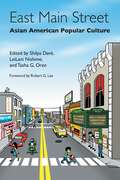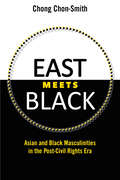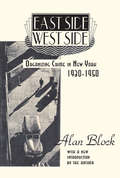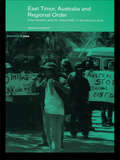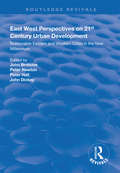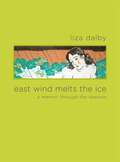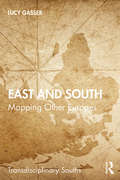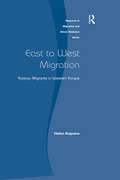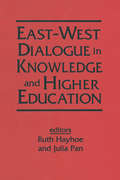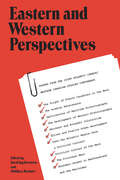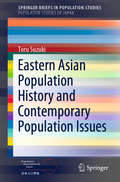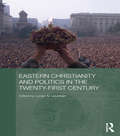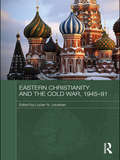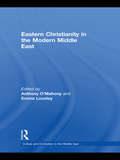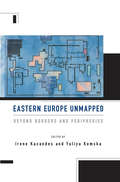- Table View
- List View
East Los Angeles: History of a Barrio
by Ricardo RomoThis is the story of the largest Mexican-American community in the United States, the city within a city known as "East Los Angeles." How did this barrio of over one million men and women—occupying an area greater than Manhattan or Washington D.C.—come to be? Although promoted early in this century as a workers' paradise, Los Angeles fared poorly in attracting European immigrants and American blue-collar workers. Wages were low, and these workers were understandably reluctant to come to a city which was also troubled by labor strife. Mexicans made up the difference, arriving in the city in massive numbers. Who these Mexicans were and the conditions that caused them to leave their own country are revealed in East Los Angeles. The author examines how they adjusted to life in one of the fastest-growing cities in the United States, how they fared in this country's labor market, and the problems of segregation and prejudice they confronted.
East Los Angeles: History of a Barrio
by Richardo RomoThis is the story of the largest Mexican-American community in the United States, the city within a city known as "East Los Angeles." How did this barrio of over one million men and women—occupying an area greater than Manhattan or Washington D.C.—come to be? Although promoted early in this century as a workers' paradise, Los Angeles fared poorly in attracting European immigrants and American blue-collar workers. Wages were low, and these workers were understandably reluctant to come to a city which was also troubled by labor strife. Mexicans made up the difference, arriving in the city in massive numbers. Who these Mexicans were and the conditions that caused them to leave their own country are revealed in East Los Angeles. The author examines how they adjusted to life in one of the fastest-growing cities in the United States, how they fared in this country's labor market, and the problems of segregation and prejudice they confronted. Ricardo Romo is associate professor of history at the University of Texas at Austin.
East Lothian Folk Tales
by Tim Porteus Donald Smith Mags MacFarlaneStoryteller Tim Porteus brings together stories from the rugged coastlines, golden beaches, rolling countryside and dramatic Lammermuir Hills of the ancient county of East Lothian. In this treasure trove of tales you will meet Scottish Kings and Queens, saints and sinners, witches and wizards, ghosts and giants, fools and tricksters - all as fantastical and powerful as the landscape they inhabit. Retold in an engaging style, and richly illustrated with unique line drawings, these humorous, clever and enchanting folk tales are sure to be enjoyed and shared time and again.
East Main Street: Asian American Popular Culture
by Robert G. Lee LeiLani Nishime Shilpa Davé Tasha G. OrenAn interdisciplinary anthology of the rich Asian American influence on U.S. popular cultureFrom henna tattoo kits available at your local mall to “faux Asian” fashions, housewares and fusion cuisine; from the new visibility of Asian film, music, video games and anime to the current popularity of martial arts motifs in hip hop, Asian influences have thoroughly saturated the U.S. cultural landscape and have now become an integral part of the vernacular of popular culture. By tracing cross-cultural influences and global cultural trends, the essays in East Main Street bring Asian American studies, in all its interdisciplinary richness, to bear on a broad spectrum of cultural artifacts. Contributors consider topics ranging from early Asian American movie stars to the influences of South Asian iconography on rave culture, and from the marketing of Asian culture through food to the contemporary clamor for transnational Chinese women’s historical fiction. East Main Street hits the shelves in the midst of a boom in Asian American population and cultural production. This book is essential not only for understanding Asian American popular culture but also contemporary U.S. popular culture writ large.
East Meets Black: Asian and Black Masculinities in the Post-Civil Rights Era
by Chong Chon-SmithEast Meets Black examines the making and remaking of race and masculinity through the racialization of Asian and black men, confronting this important white stratagem to secure class and racial privilege, wealth, and status in the post-civil rights era. Indeed Asian and black men in neoliberal America are cast by white supremacy as oppositional. Through this opposition in the US racial hierarchy, Chong Chon-Smith argues that Asian and black men are positioned along binaries brain/body, diligent/lazy, nerd/criminal, culture/ genetics, student/convict, and technocrat/athlete--in what he terms "racial magnetism." Via this concept, East Meets Black traces the national conversations that oppose black and Asian masculinities, but also the Afro-Asian counterpoints in literature, film, popular sport, hip-hop music, performance arts, and internet subcultures. Chon-Smith highlights the spectacle and performance of baseball players such as Ichiro Suzuki within global multiculturalism and the racially coded controversy between Yao Ming and Shaquille O'Neal in transnational basketball. Further, he assesses the prominence of martial arts buddy films such as Romeo Must Die and Rush Hour that produce Afro-Asian solidarity in mainstream Hollywood cinema. Finally, Chon-Smith explores how the Afro-Asian cultural fusions in hip-hop open up possibilities for the creation of alternative subcultures, to disrupt myths of black pathology and the Asian model minority. In this first interdisciplinary book on Asian and black masculinities in literature and popular culture, Chon-Smith explores the inspiring, contradictory, hostile, resonant, and unarticulated ways in which the formation of Asian and black racial masculinity has affected contemporary America.
East Side-West Side: Organizing Crime in New York, 1930-50
by William Graham SummerBased on primary source documents, this historical study establishes the interconnections between private violence and political, social, and economic life in New York from 1930-1950. By describing and analyzing both the social world and social system of organized crime, Block provides a new perspective, one based on racial and ethnic stereotypes. The book provides a penetrating look at one of the most misunderstood aspects of American society, important for historians, criminologists and sociologists.
East Timor, Australia and Regional Order: Intervention and its Aftermath in Southeast Asia (Politics In Asia Ser.)
by James CottonThis book explains the exceptional nature of the East Timor intervention of 1999, and deals with the background to the trusteeship role of the UN in building the new polity. All of these developments had an important impact on regional order, not least testing the ASEAN norm of 'non-interference'.Australian complicity in the Indonesian occupation o
East West Perspectives on 21st Century Urban Development: Sustainable Eastern and Western Cities in the New Millennium (Routledge Revivals)
by Peter Hall Peter Newton John Brotchie John DickeyPublished in 1999. Analyzing and chronicling the continued development of key information, communication and fast transport networks at a global and regional level, this book looks at the transition to an information-based economy, and its urban impacts, at a global, regional and city level. The book outlines the change by defining it as the third great societal transition in the history of human settlement, and points to key factors that have fuelled progress. These include the growth of global telecommunications and fast transport networks; the coming together of information and communication technologies and their links to transport and land use; the shift to information and knowledge as a resource base for new industries; the increasing movement of people and information; the emergence of cities as economic entities, network nodes, and centres for generating, exchanging and processing information, and, most significantly, the competition among cities for these new key elements of of the urban economy.
East Wind Melts the Ice: A Memoir through the Seasons
by Liza DalbyWriting in luminous prose, Liza Dalby brings us this elegant and unique year's journal-- a brilliant mosaic that is at once a candid memoir, a gardener's diary, and an enlightening excursion through cultures east and west. In the essays, Dalby transports us from her Berkeley garden to the streets of Kyoto, to Imperial China, to the sea cliffs of Northern California, and to points beyond.
East Yorkshire Folk Tales
by Ingrid BartonEast Yorkshire is ripe with tales of fairy gold and illusive characters. The county’s folklore is engrained in every port, cliff and bridge, passed on through whispered accounts of witches long dead, legends of strange creatures or the bawdy tales of adventuring heroes. Filey Brigg was once a dragon, the people of Skinningrove held a merman captive, and Eskdale’s Beggar’s Bridge holds a love story in its history. By night a mysterious traveller stalked Bowes Moor, with a shrivelled Hand of Glory in his grasp … These engaging stories, brought to life with charming illustrations, will be enjoyed by readers time and again.
East and South: Mapping Other Europes
by Lucy GasserWhat is "Europe" in academic discourse?While Europe tends to be used as shorthand, often interchangeable with the "West", neither the "West" nor "Europe" are homogeneous spaces. Though postcolonial studies have long been debunking Eurocentrism in its multiple guises, there is still work to do in fully comprehending how its imaginations and discursive legacies conceive the figure of Europe, as not all who live on European soil are understood as equally "European".This volume explores this immediate need to rethink the axis of postcolonial cultural productions, to disarticulate Eurocentrism, to recognise Europe as a more diverse, plural and fluid space, to draw forward cultural exchanges and dialogues within the Global South. Through analyses of literary texts from East-Central Europe and beyond, this volume sheds light on alternative literary cartographies — the multiplicity of Europes and being European which exist both as they are viewed from the different geographies of the global South, and within the continent itself.Covering a wide spatial and temporal terrain in postcolonial and European cultural productions, this volume will be of great interest to scholars and researchers of literature and literary criticism, cultural studies, post-colonial studies, global South studies and European studies.
East of East: The Making of Greater El Monte (Latinidad: Transnational Cultures in the)
by Alex Espinoza Michael Jaime-Becerra Wendy Cheng David Reid Karen Wilson Michael Weller Mark Bray Carribean Fragoza Romeo Guzmán Alex Sayf Cummings Ryan Reft Aurelie Roy Maria John Daniel Lynch Daniel Cady Yesenia Barragan Melquiades Fernandez Rachel Newman Nick Juravich Juan Herrera Adam Goodman Daniel Morales Daniel Medina Andre Kobayashi Deckrow Jennifer Renteria Jude Webre Troy Andreas Kokinis Apolonio Morales Stacy I. Macías Toni Margarita Plummer Salvador PlascenciaEast of East: The Making of Greater El Monte, is an edited collection of thirty-one essays that trace the experience of a California community over three centuries, from eighteenth-century Spanish colonization to twenty-first century globalization. Employing traditional historical scholarship, oral history, creative nonfiction and original art, the book provides a radical new history of El Monte and South El Monte, showing how interdisciplinary and community-engaged scholarship can break new ground in public history. East of East tells stories that have been excluded from dominant historical narratives—stories that long survived only in the popular memory of residents, as well as narratives that have been almost completely buried and all but forgotten. Its cast of characters includes white vigilantes, Mexican anarchists, Japanese farmers, labor organizers, civil rights pioneers, and punk rockers, as well as the ordinary and unnamed youth who generated a vibrant local culture at dances and dive bars.
East to West Migration: Russian Migrants in Western Europe (Research in Migration and Ethnic Relations Series)
by Helen KopninaThe collapse of the communist regimes in Eastern Europe brought widespread fear of a 'tidal wave' of immigrants from the East into Western Europe. Quite apart from the social and political importance, East-West migration also poses a challenge to established theories of migration, as in most cases the migrant flow cannot be categorised as either refugee movement or a labour migration. Indeed much of the trans-border movement is not officially recognised, as many migrants are temporary, commuting, 'tourists' or illegal, and remain invisible to the authorities. This book focuses on Russian migration into Western Europe following the break-up of the Soviet Union. Helen Kopnina explores the concept of 'community' through an examination of the lives of Russian migrants in two major European cities, London and Amsterdam. In both cases Kopnina finds an 'invisible community', inadequately defined in existing literature. Arguing that Russian migrants are highly diverse, both socially and in terms of their views and adaptation strategies, Kopnina uncovers a community divided by mutual antagonisms, prompting many to reject the idea of belonging to a community at all. Based on extensive interviews, this fascinating and unique ethnographic account of the 'new migration' challenges the underlying assumptions of traditional migration studies and post-modern theories. It provides a powerful critique for the study of new migrant groups in Western Europe and the wider process of European identity formation.
East-West Dialogue in Knowledge and Higher Education
by Julia Pan Ruth HayhoeThis work is a dialogue on alternative approaches to knowledge and higher education characteristic of the Western University. Western scholars approach these issues from the viewpoint of the challenges facing the university and Eastern contributors explore parallel issues in their societies.
Easter
by Nicole A. MansfieldEaster is about celebrating Jesus Christ dying and coming back to life. It is a Christian holiday. People attend church. They also gather for a big meal and activities like egg hunts. Readers will discover how a shared holiday can have multiple traditions and be celebrated in all sorts of ways.
Easter
by Nicole A. MansfieldEaster is about celebrating Jesus Christ dying and coming back to life. It is a Christian holiday. People attend church. They also gather for a big meal and activities like egg hunts. Readers will discover how a shared holiday can have multiple traditions and be celebrated in all sorts of ways.
Easter (Traditions & Celebrations)
by Nicole A. MansfieldEaster is about celebrating Jesus Christ dying and coming back to life. It is a Christian holiday. People attend church. They also gather for a big meal and activities like egg hunts. Readers will discover how a shared holiday can have multiple traditions and be celebrated in all sorts of ways.
Easter Island's Silent Sentinels: The Sculpture and Architecture of Rapa Nui
by Kenneth Treister Patricia Vargas Casanova Cristino ClaudioIt may be the most interesting and yet loneliest spot on earth: a volcanic rock surrounded by a million square miles of ocean, named for the day Dutch explorers discovered it, Easter Sunday, April 5, 1722. Here people created a complex society, sophisticated astronomy, exquisite wood sculpture, monumental stone architecture, roads, and a puzzling ideographic script. And then they went about sculpting amazing, giant human figures in stone.This richly illustrated book of the history, culture, and art of Easter Island is the first to examine in detail the island&’s vernacular architecture, often overshadowed by its giant stone statues. It shows the conjecturally reconstructed prehistoric pole houses; the ahu, the sculptures&’ platform, as a spectacular expression of prehistoric megalithic architecture; and the Easter Island Statue Project&’s inventory of the colossal moai sculptures.This publication is made possible in part by a generous contribution from Furthermore: a program of the J. M. Kaplan Fund.
Easter: Its Story and Meaning
by Alan WattsTHE FORGOTTEN PAGAN ORIGINS OF CHRISTIANITY’S MOST EMBLEMATIC CELEBRATION “Easter — by whatever name it may be known — is a theme common to almost every religion and every people.” — Alan Watts Along with Christmas, Easter Sunday is one of the two most popular celebrations on the Church calendar. For millions of believers around the world, it encapsulates the central message of Christianity. Yet Easter has become associated with a perplexing jumble of non-Biblical customs: colorful eggs, chocolate rabbits, evening bonfires, children’s songs, mischievous games, and more. Philosopher Alan Watts proposes that these curiosities are vestiges of a tradition far older than Christianity. In Easter: Its Story and Meaning, Watts goes in search of the lost origins of Easter, taking readers with him on a kaleidoscopic tour of history, anthropology, and myth. He begins on the scorching plains of Bronze Age Mesopotamia, wanders the marble temples of imperial Rome, enters the glittering cathedrals of medieval Europe, and eventually lands in modern America. In the course of the journey, Watts unravels the multilayered symbolism of Easter and places the holiday within the broader context of world religions. He also delves into several tantalizing historical enigmas, such as: • Why is Christianity’s most sacred holiday named after a pagan goddess? • Is Jesus Christ historically unique, or is he just another example of the “dying-and-rising god” archetype common in antiquity? • How was the date of Easter calculated by the patriarchs of the early Church? • Where did the tradition of the Easter egg come from? (Could it be African?) The book closes on a lighthearted note, with a collection of weird and wonderful Easter folk traditions old and new. From beginning to end, Watts employs his keen intellect and vast erudition to uncover hidden connections between seemingly unrelated events. The result is a philosophical adventure that will enlighten readers of all religious backgrounds. Watts concludes that Easter is a universal celebration of nature’s eternal cycle of life, death, and rebirth — a celebration for all humanity.
Eastern & Western Perspectives: Papers from the Joint Atlantic Canada/Western Canadian Studs. Conference
by Phillip Buckner David Jay BercusonThe Atlantic Canada and Western Canada Studies Conferences have focused attention in recent years on the culture and development of two widely separated regions which have been frequently ignored in studies of the Canadian nation. The Atlantic Canada Studies Conference, meeting in 1974 and 1976 at the University of New Brunswick, and the Western Canadian Studies Conference, meeting annually since 1968 at the University of Calgary, have brought together scholars from a variety of disciplines to study the identities and characteristics of these two hinterlands. In 1978 the two conferences met jointly, in a session in Fredericton and one at Calgary with a core of speakers and papers common to both. The purpose was to compare and contrast subjects and experiences of interest and concern in the west and in Atlantic Canada. The ten papers which comprise Eastern and Western Perspectives are selected from twenty-seven presented at the joint conference.The topic chosen not only illustrate some of the preoccupations of regional historians and political scientists, but also echo many of the concerns of Canadians in general. The plight of islands and francophone culture in the midst of an overwhelmingly Anglo-American society, the search for identities in the face of persisting stereotypes, the effects of economic and urban development, the distinctiveness of local political cultures--all are subjects whose study enriches both regional and national history. This volume brings together explorations of these themes from eastern and western points of view and makes a unique contribution to a greater understanding and awareness of the regional dimension in Canadian life.
Eastern Asian Population History and Contemporary Population Issues (SpringerBriefs in Population Studies)
by Toru SuzukiThis book interprets and explains contemporary population issues from historical and cultural perspectives. These include lowest-low fertility in the Republic of Korea and Taiwan, early population aging in China relative to the developmental level, and various modes of domestic and international migration in the region. The book shows that divergent fertility decline can be attributed to the family patterns established in the pre-modern era in each country. It also examines the diversity of international migration in Eastern Asian countries today is also understood from the long-term historical view.
Eastern Christianity and Politics in the Twenty-First Century (Routledge Contemporary Russia and Eastern Europe Series)
by Lucian N. LeusteanThis book provides an up-to-date, comprehensive overview of Eastern Christian churches in Europe, the Middle East, America, Africa, Asia and Australia. Written by leading international scholars in the field, it examines both Orthodox and Oriental churches from the end of the Cold War up to the present day. The book offers a unique insight into the myriad church-state relations in Eastern Christianity and tackles contemporary concerns, opportunities and challenges, such as religious revival after the fall of communism; churches and democracy; relations between Orthodox, Catholic and Greek Catholic churches; religious education and monastic life; the size and structure of congregations; and the impact of migration, secularisation and globalisation on Eastern Christianity in the twenty-first century.
Eastern Christianity and the Cold War, 1945-91 (Routledge Studies in the History of Russia and Eastern Europe)
by Lucian N. LeusteanDespite widespread persecution, Orthodox churches not only survived the Cold War period but levels of religiosity in Orthodox countries remained significant. This book examines the often surprising relations between Orthodox churches and political regimes. It provides a comprehensive overview of the dynamics between Eastern Christianity and politics from the end of the Second World War to the fall of communism, covering 40 Orthodox churches including diasporic churches in Africa, Asia, America and Australia. Based on research from recently-opened archives and publications in a wide range of European languages, it analyses church-state relations on both sides of the Iron Curtain. It discusses the following key themes: the relationship between Orthodox churches and political power; religious resistance to communism; the political control of churches; religion and propaganda; monasticism and theological publications; religious diplomacy within the Orthodox commonwealth; and religious contacts between East and West.
Eastern Christianity in the Modern Middle East (Culture and Civilization in the Middle East)
by Emma Loosley Anthony O'MahonyThe Middle East is the birthplace of Christianity and the home to a number of Eastern Churches with millions of followers. This book provides a comprehensive survey of the various denominations in the modern Middle East and will be of interest to a wide variety of scholars and students studying theology, history and politics.
Eastern Europe Unmapped: Beyond Borders and Peripheries
by Yuliya Komska Irene KacandesArguably more than any other region, the area known as Eastern Europe has been defined by its location on the map. Yet its inhabitants, from statesmen to literati and from cultural-economic elites to the poorest emigrants, have consistently forged or fathomed links to distant lands, populations, and intellectual traditions. Through a series of inventive cultural and historical explorations, Eastern Europe Unmapped dispenses with scholars' long-time preoccupation with national and regional borders, instead raising provocative questions about the area's non-contiguous-and frequently global or extraterritorial-entanglements.


